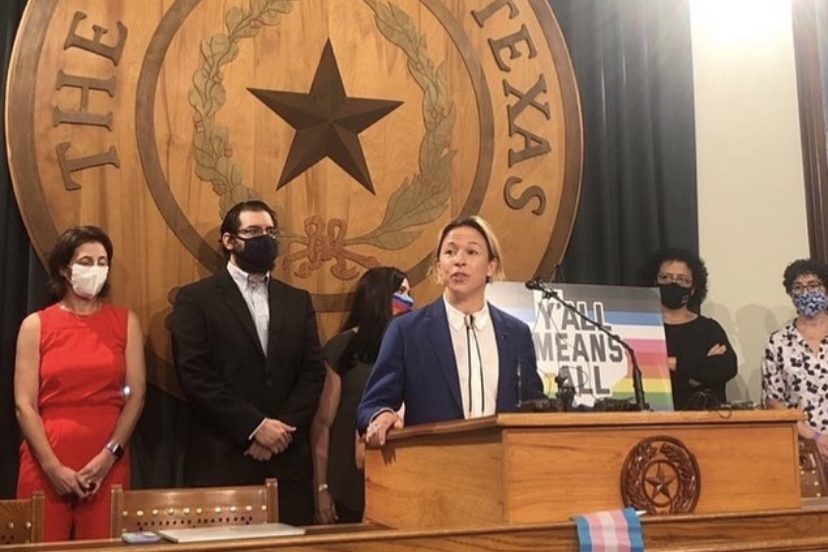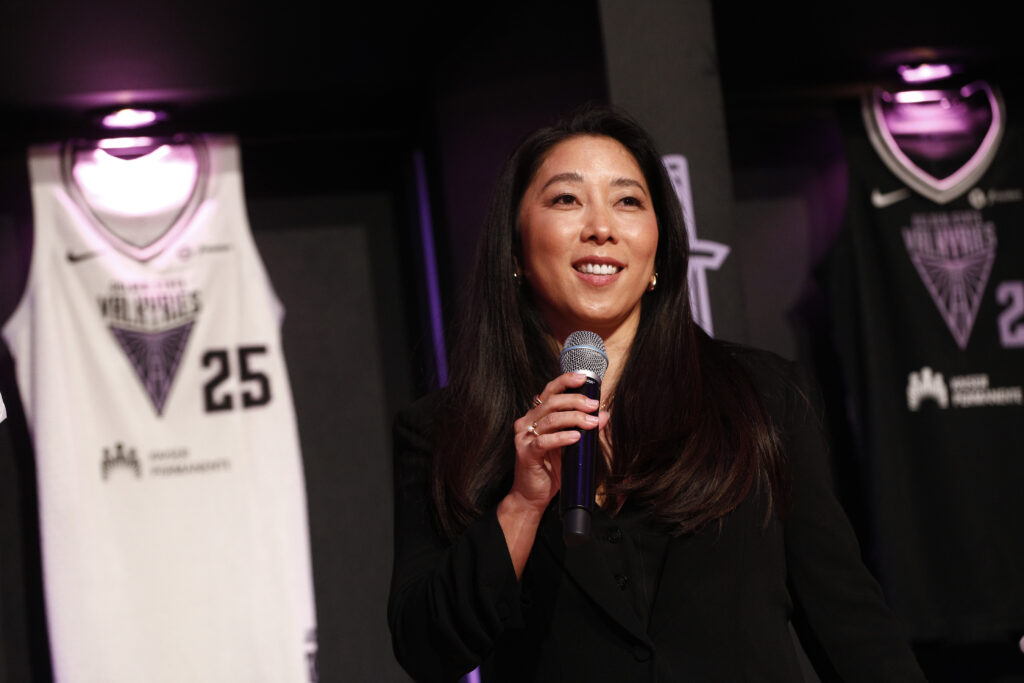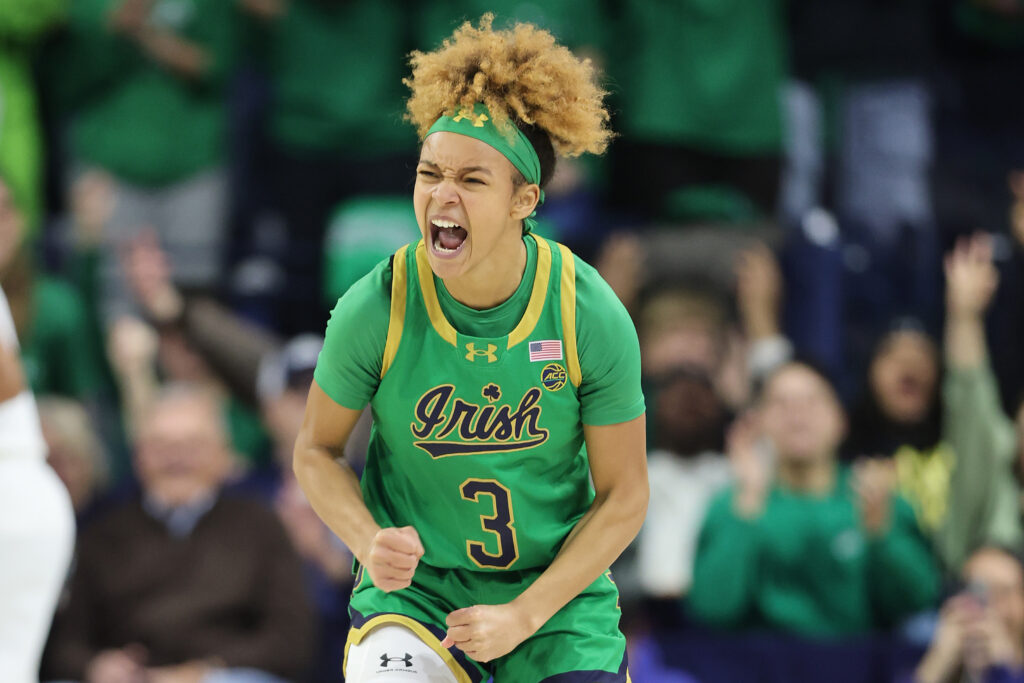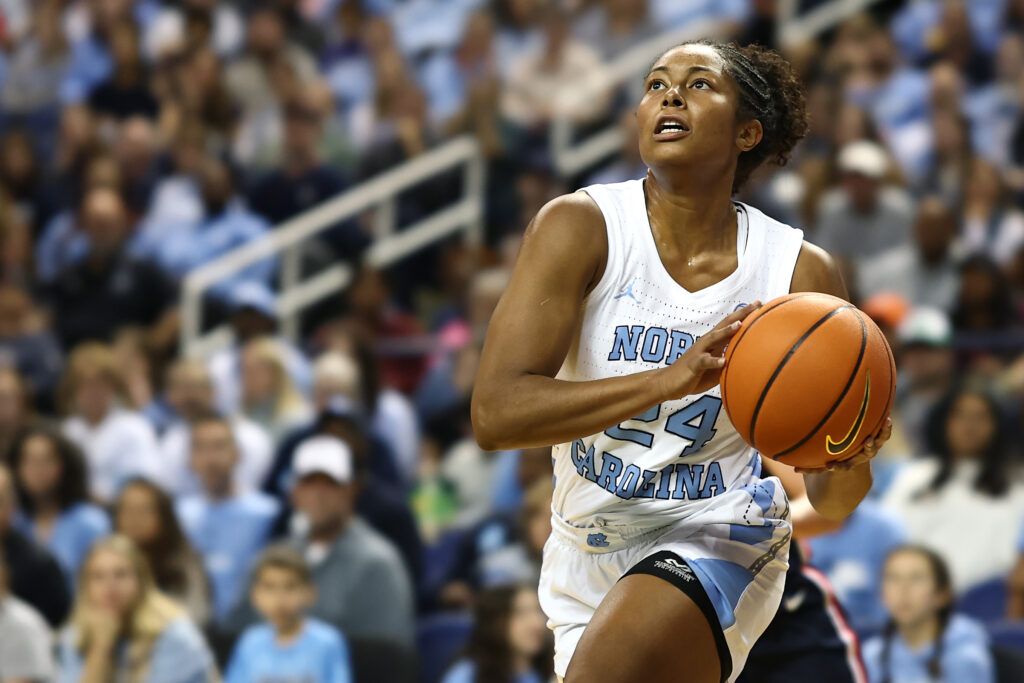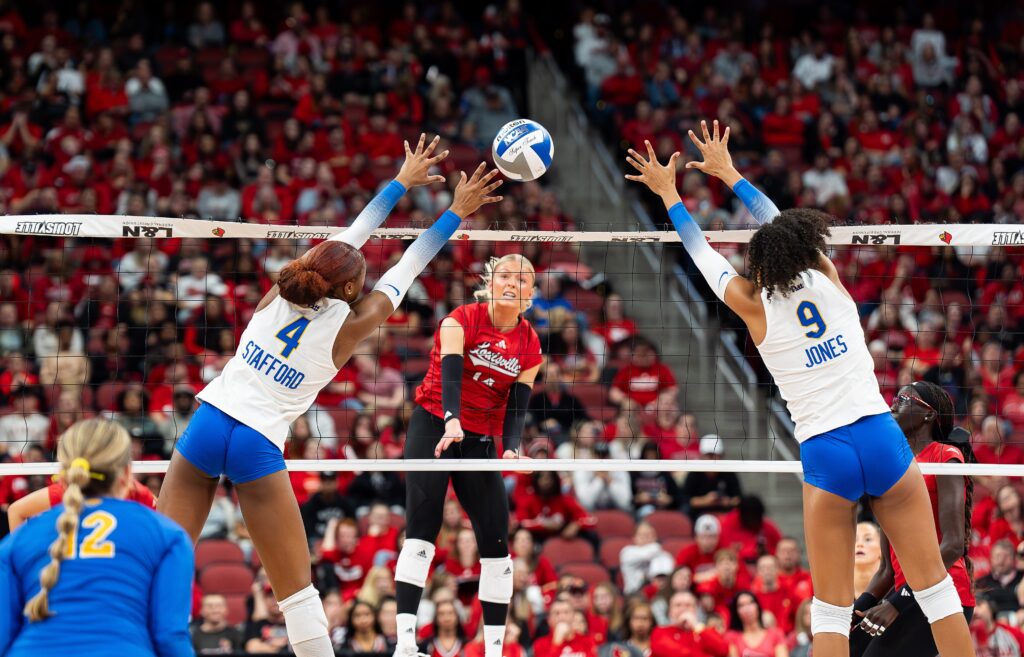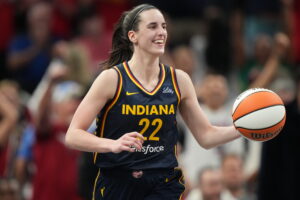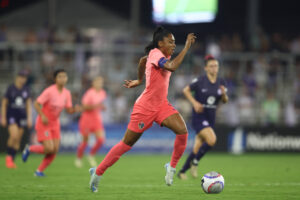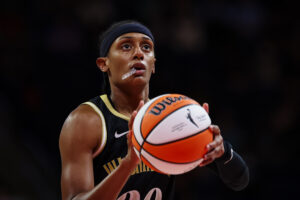In late August, Anne Lieberman traveled to the Texas State Capitol to testify against HB25, a bill that would ban transgender youth from participating on sports teams that align with their gender identity.
Two months later, despite Lieberman’s and others’ best efforts, Texas Governor Greg Abbott signed the bill into law, making Texas the 10th state in the United States to pass such legislation. To Lieberman, the Director of Policy and Programs at Athlete Ally, a nonprofit organization dedicated to achieving LGBTQ+ inclusion in sports, the result served as yet another reminder of the work that needs to be done.
Chelsea Wolfe aims to open people’s minds just by being herself. Wolfe, a transgender woman and professional BMX rider, was one of four transgender or non-binary athletes to compete at the Tokyo Olympics this past summer as part of Team USA. Sports have been an outlet for her for as long as she can remember, and the idea of politicians barring children and teenagers from playing the sport they love because of their identities both disgusts and motivates her. As an Athlete Ally ambassador, Wolfe is committed to the fight against these bills and for inclusion.
Ahead of Trans Day of Remembrance on Saturday, Just Women’s Sports sat down with Lieberman and Wolfe to talk about the myths fueling anti-transgender legislation across the country, how women’s sports leagues have led the way in pushing for change and what people can do to get involved and make a difference.
We’ve recently seen a wave of bills passed in state legislatures across the country barring transgender youths from participating in sports based on their gender identity. Anne, you’ve been with Athlete Ally for several years now. What are you and the organization doing to combat these developments?
Anne Lieberman: Since I started with Athlete Ally in 2017, trans and non-binary inclusion has been a big focus of the work because we saw this conversation around trans athletes really start to pick up in 2015, 2016, and then into 2017. We’ve been doing a lot as an organization to fight these bills, but I think our primary area of focus has been working with state-based LGBTQ+ organizations and connecting our athlete ambassadors, like Chelsea, to different opportunities to speak up and out on harmful legislation. That work really ranges from in-person and written testimony at the state level, to events on social media raising awareness, to signing onto amicus briefs.
Then another really big chunk of our work has been educating athletes at all levels of sports on trans and non-binary inclusion. We often just say trans inclusion, and that’s not to leave out non-binary people or non-binary athletes, but it’s really because the primary focus of these absolutely heartbreaking and dangerous bills has been on trans athletes and, specifically, trans kids. At the end of the day, we don’t want to lose sight of the fact that lawmakers are using kids as a political chip, a bargaining tool, to keep kids from playing sports with their friends and to keep trans kids and non-binary kids from being full citizens of this country.
I definitely want to get into how you talk about these issues with athletes across sports. But first, Chelsea, as an Athlete Ally ambassador and a transgender athlete, what has your approach been to opposing these bills?
Chelsea Wolfe: I feel like a lot of the work that I do combating these bills and the rhetoric that is allowing these bills to be pushed through, like it’s some kind of acceptable thing to target children like that, is just trying to exist openly and fully as a trans athlete and doing so visibly to change the narrative. So that people know that trans athletes exist and we’re no different than any other athlete out on the field, and that we deserve the same rights to be there as they do. Part of that also is working with Athlete Ally, connecting me with opportunities to use my voice and speak up, signing the amicus briefs and just being involved in whatever way I can. In addition to using my own social media platforms and connections, I try to just spread the message and let people know that these atrocities are happening and that they need to be speaking up about them.
On that note, I think there are a lot of people out there who read the news and feel like there’s a way they want to get involved to help in this effort but aren’t sure where to start. What would you say to them? What would your advice be?
Wolfe: I would say the best way to start would be to follow trans athletes on social media. There are a number of us out there — myself and Chris Mosier are good places to start. You can connect with other trans athletes; we share each other’s posts to our stories all the time. Most of us are talking and posting about these things frequently, and that will be an easy way to get connected with places where you can use your voice to sign things, speak up, share with your connections and then really look to get involved with organizations like Athlete Ally and get on board with campaigns that they organize.
Lieberman: Yeah, echoing everything Chelsea said. I would also say, I know that it can be really overwhelming to read the news and feel like whatever “small thing” an individual does isn’t going to make a difference, but it absolutely does. Chelsea mentioned Chris Mosier. Chris is somebody who puts out very specific action alerts on every single bill. And Chris is also very keyed into what is happening at the state level, so all of the things Chris puts on social media are in line with what state organizers think is going to be the best thing strategically to kill these bills. It could be calling the governor. It could be trying to contact your friends in that state. So I think sometimes we get overwhelmed with the idea that we have to do the most, when really, if you can commit to one or two concrete actions, it does make a difference.
I think the other thing we can do, in addition to the work on the legislative front, is create or dismantle structures of oppression at every moment in our everyday lives. So if you hear somebody say something transphobic or sexist or racist or whatever, it’s really important to engage with that and say, “You can’t say that around me,” or “What you said is really hurtful and here’s why.” Or if you have a trans friend or a non-binary friend who’s mis-gendered, step in and be an ally to that person and correct the person who mis-gendered them with their correct pronouns. There are the big-picture things, but there are also things that happen in our everyday lives that are really important in terms of each and every one of us creating the world that we want to live in, which is one that respects everyone.
Wolfe: That raises a really good point that, even if your own personal actions aren’t what single-handedly tips the scales in favor of blocking these bills from going through, whether you are vocally against these bills and speaking out in support of trans athletes and specifically trans kids, or whether you are silent and ignoring it, there are trans people and trans kids in your life who will see that. And that is going to make the difference between them knowing that they have someone in the world on their side looking out for them who truly cares about their well-being and feeling like they are alone and defenseless in this world, which is really the goal of these bills. That’s why they target children, because they don’t have as much of an ability to speak up for themselves as adults do and defend themselves. So I think it’s really up to the adults in their lives to take every opportunity that they can to show that they actually care and want to look out for their well-being. Even if you don’t personally stop the bill from going through, at the very least if they see you trying, you may not change the world, but you can change that kid’s life.
Those are such important points, and Chelsea, it’s a perfect segue into your story. You went through your own self-discovery process as a transgender women and have been an athlete your whole life. How have sports helped you on that journey?
Wolfe: It’s honestly hard to even separate the ways that sport has helped me because I obviously participate in sports as myself. And like you mentioned, I’ve spent my entire life involved in sports. So really my development as a person, my ability to meet people and communicate and establish friendships, developing a sense of self, setting goals for myself and learning how to work for them and handling setbacks, all of those skills are things that I’ve developed through my involvement with sports. And if I didn’t have that opportunity, I have no idea where I would have ended up in life.
For athletes who are being barred from sports based on their gender identities because of these bills, how do you think that is affecting them on a personal level?
Wolfe: It’s hard to even think about how that must feel for them, because when I was coming up as a trans youth in sports, the knowledge that trans people even existed wasn’t in the public discourse as much yet. So it wasn’t even necessarily that we were being targeted by attacks; it was more that that was the way of the world as it was structured, to exclude us, and getting through that was hard enough. But trying to learn to grow up in the world and just exist as yourself as you’re being targeted and harassed, by grown adults in government, in positions of power — I can’t imagine how that must feel. And I just hope that these kids all have the support they need to be able to cope with that and we’re able to steer these attacks away from them.

Have you been able to have conversations with other athletes in your sport — and in other sports — about these issues? How have those gone?
Wolfe: It’s kind of a mixed bag. There have been some people who I am so grateful for the effort and the work that they’ve already put in to help us in this struggle. And then there are other people I’ve talked to, and I could tell that they’re just finally realizing how critical this work is. And then there are others who just don’t seem to care enough, whether or not they actively don’t want trans athletes in sports, or if they just don’t care enough to ensure equal human rights that they’re not getting involved. That has been on occasion. But I feel like part of my responsibility as an athlete in my position is to have those conversations and hopefully steer other athletes to use their platforms for something good, other than just landing another energy drink sponsor, going off to some cool place and having fun with it. We’re in a very unique position where we can use our privileges to influence the world around us. And I think not using that privilege to help others and for good is really falling short on our responsibilities as citizens of the world.
Another big platform, of course, is Athlete Ally, which you both are heavily involved in. Anne, you’ve traveled around the world for your work in sports advocacy. Have there been unique challenges with this particular fight for trans inclusion?
Lieberman: Yeah, I think one of the things that is particularly unique — and really more harrowing — is the way in which kids are being used as a wedge issue and a political bargaining chip. I mean, we are talking about kids who want to play sports with their friends and there’s nothing political about that. So I think we try to bring to the forefront the reality of the situation, which is that all of these conversations are a solution in search of a problem, because there is just absolutely no evidence that trans athletes, and most certainly not trans kids, have or will have ever dominated women’s sports. And I think the other thing that has been surprising and heartbreaking is the number of cis women athletes and people, who I and Athlete Ally as an organization really viewed as champions of LGBTQ+ equity in sports and were so fantastic on so many other issues, who have been incredibly transphobic and narrow-minded about women’s sports.
The more time we spend talking about excluding trans athletes with these anti-trans bills, the less time we actually spend talking about the real documented and rigorously researched challenges to women’s sports from people like the amazing scholars at the Tucker Center and the Women’s Sports Foundation. You can list so many amazing organizations that have done that work. And what we should be focused on are more resources for women’s and girls’ sports programs, even implementation of Title IX, addressing the rampant sexual harassment and abuse that occurs for women and girls growing up in sports. There are so many issues, and the whole conversation and the vitriol that is directed at trans athletes is so misplaced and taking us away from the larger picture about what we love about sports and what we love about women’s sports specifically. And so that has also been a really, really challenging piece of this conversation. I don’t quite understand how we can have two people say, “Sports saved my life. Therefore everyone should have access to sports,” and then, “Sports saved my life. Therefore we should ban trans athletes from sports,” which is literally what happened in Texas when I was testifying. I just don’t understand how we get to two such wildly different conclusions.
I asked before what you would say to people who want to help. But for the people who might be pulled the other way by the negative rhetoric, what are some of the myths you would want to debunk?
Lieberman: I think this idea that there is only one indicator of athleticism and that people assigned male at birth will always be bigger, faster, stronger than people assigned female at birth, it’s just not true. There are so many different factors that go into making a champion athlete and physicality is only a part. We have access to resources, access to good coaching and nutrition, different sports lend themselves to different body types. I’m a Muay Thai fighter and coach, and I use this example a lot: I’m small. I’m 5-2 and I don’t have particularly long limbs. I don’t really have the body for Muay Thai, but I’m gritty and I do it anyway. And there are other things that make me a good athlete and a good fighter, but people who are taller and thinner, can get to a lower weight class and have a better reach often have more tools to work with than I do. That’s just one sports-specific example.
When we look at, for example, world rugby — and world rugby has banned trans women from international competition — part of the conversation was, “OK, trans women who are over this height and this weight … can’t play.” And then you had a whole bunch of wonderful cis woman allies holding up signs saying, “I’m 5-10 and 170 pounds. Should I not play rugby?” So it’s talking about the diversity of bodies, especially with cis women. And we have to look at, if we’re talking about these bills, what is the conversation at hand? And for the most part, we’re not talking about the Olympics. We’re not even talking about college sports. We’re talking about kids who want to play sports with their friends. And so I think, especially for people who are just starting to try to understand this issue, what is the purpose of sport at all levels? And I think we all want kids to have access to all the things Chelsea described: being part of a team, finding oneself, leadership skills, so many things that we find in and through sport.
Wolfe: You touched on a good point about how it’s so odd that some people can get so many other things, but then when it comes to trans inclusion in sports, they just completely about-face and align themselves with the same forms of oppression and tools and bigotry that have been used against them their whole lives. And it strikes me how it’s possible for one person, the same mind, to simultaneously be of the belief that women are strong and capable and can do anything men can do and maybe more, but then when a trans woman does it, it’s like, “Oh wait, but not like that.” It’s called transmisogyny, not because it’s something that is only directed at trans women, but because it affects all women as a form of misogyny. And its reach, its effects and where it derives its power from, is something that inherently harms all women, cis women included.
So, if somebody is trying to say, “Cis women are incapable of being on the same level as trans women,” it’s like, dang, that’s kind of counting yourself out before you even tried, isn’t it? It’s mind-blowing to me that somebody could say that and believe that is something that is empowering for cis women. There’s literally nothing to suggest that there is a difference in performance, but if you’re saying that you don’t even stand a chance competing against trans women, what are you saying over here about how you deserve all the same opportunities and rights as cis men? The beliefs that are co-existing in these people’s minds conflict with each other, and it makes absolutely no sense how they can believe both of those things at the same time. Transmisogyny is just misogyny that’s come out in a different avenue. It is still the exact same belief that women are not capable and are inferior. It’s frankly disgusting and insulting that anyone would even say that, and especially then go turn around and try to say that they’re standing up for women’s rights and call themselves a feminist.
Lieberman: Yeah, exactly that, Chelsea. Essentially what we’re saying is that, if a woman is too good at sports, she can’t actually be a woman and it goes against so much of what we’re all fighting for, which is equity.
Wolfe: Yeah, I see it all the time, too, with some of the cis women who I compete with in my sport. On social media, they’ll post a clip of a new trick they learn and they’ll just get a whole bunch of dudes in there saying that they’re trans and stuff. And it’s like, one, that’s not an insult. But also those guys are saying that you’re performing on a level that we deem too good for what women can accomplish. So we are going to claim that you’re really a man to diminish what your accomplishments really are? It just blows my mind that anyone, and any woman, could ever align themselves with that kind of a person who is actively working to ridicule and minimize women and women’s sports and what we’re capable of.
Across most major sports leagues, we have seen progress in LGBTQ+ acceptance, with athletes coming out publicly as gay and leagues celebrating Pride Month. Why do you think it’s taking longer for trans athletes to be embraced in the same way?
Wolfe: In a word, transphobia. There’s really no other explanation for it. I’ve met plenty of people who claim to be allies to the LGBTQ+ community but really only care about the LGB part of it and think that trans folks and intersex people should be actively excluded from the progress that the LGBTQ+ community has made. And it’s like, the rights that you enjoy today as a gay athlete, as a lesbian athlete, as a biathlete, whatever, those are afforded to you because trans women of color started the Pride movement in order to get us moving in a direction where you even have a right to exist and compete as an athlete. And now to try to turn around and say, “Oh, well, all this progress wasn’t meant for you.” Like, no, this was started by us.
It doesn’t take a whole lot of pattern recognition skills to be able to see it. It’s just really unfortunate that people have that hate in their hearts and they aren’t working to unlearn what has been ingrained into them by societal beliefs. I just really hope that people are realizing they need to be making this effort for transphobia in addition to all the other forms of oppression that they’re unlearning.
Lieberman: I think what we’re seeing in our work with athletes is there are a lot of people, especially cis women athletes, who want to be allies but aren’t sure what to say, and they don’t want to say the wrong thing. They’re worried about being canceled or coming across in a bad way. That’s why a lot of the work we do is to try to prep athletes and give them the skills so that they can really be allies in this fight. And I think we really are seeing a strong uptick in athletes, and specifically cis women, who are signing amicus briefs. Like the one Chelsea mentioned that we released last month, we co-organized it with the Women’s Sports Foundation and Lambda Legal, and the Women’s National Basketball Players Association signed onto the brief, which was huge. They got additional sign-on from WNBA players. We’re seeing people from Candace Parker to Billie Jean King to Megan Rapinoe to Imani Dorsey really take leadership roles.
Some of our best allies in this fight, unsurprisingly, have been Black women. Just like when we look at the beginnings of the [Black Lives Matter movement] in this country, who were the first people to make public statements as athletes? It was a handful of athletes with the Minnesota Lynx and the WNBA, but specifically Black women have led the way on so many social justice issues in sports. I think that is often not given voice to, and I think similarly, in the fight for trans inclusion, Black women’s bodies have been so heavily policed under these very specific ideas of white femininity and athleticism that are upheld in structures of sport all around the globe. And we don’t have time to get into neocolonialism and all those other conversations, but there’s a clear intersection between white supremacy and transphobia because both of those structures support one another. So it’s not surprising that Black women would, yet again, be some of the best allies in this fight and really the most vocal and brave within the athletic community.
That reminds me, I’ve heard multiple athletes say that they don’t even have the option to “stick to sports” because women in sports live at all of these intersectionalities. How have you seen women’s leagues lead the way in this effort?
Lieberman: The WNBA players have gone above and beyond in terms of getting involved in the fight, really lending their voices to different campaigns, speaking on panels. I get really emotional even thinking about it. Like at the drop of a hat, Coach [Cheryl] Reeve from the Minnesota Lynx literally turned on a dime and canceled practice so that she and some of her players could attend a press conference because they understand how much this is going to impact women’s sports, and they really want to lead the way. We’ve just been so lucky to get to work with the WNBA really closely, and the players association that has been such a champion. Same thing with the National Women’s Soccer League and the players association, they are ready. I will also say the Premier Hockey Federation, formerly the NWHL, has been amazing. It gives me goosebumps to think about the momentum we’re building, because no matter what happens with these state bills, conversations are happening and people’s minds are changing, and we have some of the biggest names in women’s sports on our side. It’s just going to be a matter of time until people really understand the full scope and importance of the dignity and human rights of trans and non-binary people.
“You are a trailblazer not only for your incredible achievements in soccer, but also for the way you lead with your heart and fight for what you believe in.” - @mpinoe presenting an #ActionAward to fellow Athlete Ambassador @thequinny5 on behalf of @OLReign pic.twitter.com/r2zTxy65ou
— Athlete Ally (@AthleteAlly) October 27, 2021
Wolfe: It is so impactful to see that from some of the greatest players in women’s sports and just people recognizing that sports don’t exist in a vacuum. We can’t just stick to sports because sports aren’t just sports. It is culture, it is our society, and so many things are reflected in change within sports. So we can’t just focus on riding a bike or playing our individual sport. It’s all connected to the world in ways that are much bigger than what we’re doing with our sports as individuals. And I think to ignore that responsibility would be a massive abuse of privilege. So seeing people who are stepping up to that challenge and that responsibility is really fantastic. I appreciate that work greatly, and I hope that we can continue to work together to build on each other’s work.
Chelsea, you recently competed at the Tokyo Olympics as one of four trans or non-binary athletes. Did you see the representation in Tokyo as a watershed moment for progress toward trans inclusion?
Wolfe: Oh my gosh, definitely. Of course, there’s still so much work to be done. I’ve heard people saying, like, “Oh my gosh, all of a sudden there are four trans athletes in the Olympics.” It’s like, given that we are roughly 1 to 2 percent of the global population, if we were to have actual representation, there would be closer to 50 something. The fact that we finally have four is fantastic. It wasn’t just one of us that finally broke through that wall for the first time. It’s absolutely incredible, as well, that Quinn was a part of winning a gold medal [with Canada soccer]. It has me at kind of at a loss for words for how incredible that moment was. Trans athletes have been allowed to compete in the Olympics since 2003, I believe, and for us to finally have representation on that level is so spectacular. It just meant the world to me to get to be a part of that.
From being on that world stage and having that platform, did you find that you were able to inspire people back home?
Wolfe: I really hope that it has given hope to the people who need it, particularly the kids who are being attacked with all of these bills, just to show them that there is a future for them and there is a place for them in this world. And I hope that it also has mobilized more people who maybe were not doing everything that they could to help in this fight. Unfortunately, I have seen that the opposition has been particularly motivated in the time since, so I hope that we are using the power of that moment to energize our own movements and our own efforts in ways that far surpass what the opposition has taken from it.
We’ve talked about the progress you’ve seen from the women’s leagues leading the way. What would you like to see from leagues and athletes who have not stepped up?
Wolfe: Just being more vocal. We’re all on social media. Post about it. When these bills are pushing through, share your support of trans athletes, sign on to these amicus briefs, follow trans athletes, follow Athlete Ally and just get involved. And don’t be shy about being involved in these organizations that are working to ensure equal rights for everybody. I think at this point, if you’re shying away from your responsibility to do this, you’re really missing the ball because it’s 2021. It is well-established that the right thing to do is to stand up for trans athletes. So I really hope that we start to see more people stepping up to the plate and fulfilling their roles as athletes to be role models and leaders of change.
And Anne, what is next for Athlete Ally?
Lieberman: So much. We’re obviously going to continue our work training and educating on trans inclusion with athletes, teams, leagues and sport governing bodies. We have a really fantastic flagship research report called the Athletic Equality Index that ranks and reports the LGBTQ+ inclusiveness, or lack thereof, of every single Division I institution. Part of the criteria for that is: Does that institution have a trans inclusion policy? So we’re also working to make the patchwork of policies that currently governs the participation of trans athletes more consistent. We have a fantastic communications director in Joanna Hoffman, who is a storyteller at heart, and we’re going to continue to highlight trans and non-binary athlete voices, especially athletes of color and Black trans athletes. And we’re going to keep fighting every single bill tooth and nail with the help of other national organizations and state partners.
We’re having this conversation before Transgender Day of Remembrance on Nov. 20. What does that day mean to you both and how do you plan to honor it?
Wolfe: It’s obviously a very solemn day for all of us in the community. I’m sure many of us are not too many degrees removed from people who have been victims of violence, if we haven’t been victims ourselves. And when we broaden our understanding of what violence means, it really allows us to see the bigger picture of what trans people and trans athletes face in this world. I think a lot of times, violence is seen as somebody physically attacking and assaulting a person, but it’s so much more than that — a lack of access to healthcare, a lack of access to housing, food and shelter, and a lack of access to sports. These attacks on trans youth are more than just taking away an afterschool activity from them. These bills are an act of violence, and the people who are pushing this through and are in support of this have blood on their hands because that is physically harming the well-being of children. I think that will be something that’s important for all of us to reflect on on Trans Day of Remembrance: We are not just mourning the lives of those who have been taken by somebody who physically attacked them, but we are mourning the lives of trans people who have been taken by the constant harassment and brutality that we face in this world.
Lieberman: To Chelsea’s point, when we look at the situation in Texas, we know that calls to the Trevor Project, suicide prevention hotline and trans lifeline, which is another suicide hotline, increased threefold because of these bills, because kids are hearing their identities and their humanity debated by adults. And so, to underscore Chelsea’s point, this is causing serious harm and these bills are violent. I think for me, Trans Day of Remembrance is always a time to reflect, and also a time to practice self-care and self-love because this work is hard. When I think about the amazing trans athletes in our network, like Chelsea, and just the amount of hate that they get in their inboxes on a daily basis, and the amount of hate that we get often as an organization because we’re just trying to protect kids and make sure everyone can participate in sport, it can be really challenging. So it’s a good moment to stop and reflect and recharge for the fight ahead.
Wolfe: Yeah, use this as a reminder that we are honoring those we’ve lost by creating a world that protects those of us in the future, and living fully and openly in ways that we all should have had the opportunity to.
For more information about Athlete Ally and their work to champion LGBTQI+ inclusion in sport, please visit www.athleteally.org and follow @AthleteAlly.
Hannah Withiam is the Managing Editor at Just Women’s Sports. She previously served as an editor at The Athletic and a reporter at the New York Post. Follow her on Twitter @HannahWithiam.
